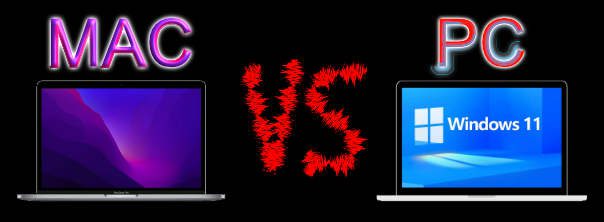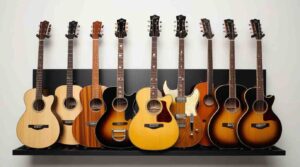Bringing context to the age old debate, lets examine the current state of OS preferences for media production.
TL;DR:
Mac
- PROS
- Incredible performance for audio and video applications.
- Unmatched battery life in the laptop market
- CONS
- CPU, RAM, and GPU cannot be upgraded after purchase.
- Backwards compatibility is greatly reduced since migration to Apple Silicon.
Windows PC
- PROS
- Better control over choice of hardware and customiation
- Backwards compatibility (including some 32bit plugins).
- CONS
- Laptops run hotter than Macs at the same performance levels.
- Sleep functions vary between manufacturers and models. A huge annoyance even among high-end PC models.
Linux (Honorable Mention)
- PROS
- Many “flavors” of OS options, many of which are fully featured out of the box such as Pop! OS, Ubuntu, and Fedora Core.
- Works with new and old hardware. Nvidia driver support for Blender and other graphic intensive applications.
- CONS
- Not popular among major developers because it lacks a strong monetization. Most Linux users prefer open source software.
- For the above reason, no VST support out of the box. Tools like Audio Gridder offer a way to host plugins in Linux from other computers on the same ethernet network.
- Most peripheral USB hardware will need to be class-compliant as there is generally little proprietary driver support.
Perspectives:
The MacOS Dilemma
The day-to-day experience and performance is excellent. I get great battery life, it runs cool on my lap, and it can take most of the loads I would throw at a laptop in its class. So what’s wrong? Compatibility! Apple has pushed the edge in such an impressive way, but at the cost of leaving the past behind. I respect that, it’s a concept I talk to my wife about 😆.
Seriously, I like the idea of dumping Intel chips for better efficiency, security, and next-generation tech. That’s why I buy Apple products. For some applications, specifically music software…this is a risk to our legacy of work.
I’m not talking about 32bit to 64bit problem. I’m talking about software developers chasing the carrot every year to keep their software up to date with Apple’s rapidly-evolving paradigm. Several software versions that I have tied to existing projects became obsolete relatively quickly as major revisions were underway to comply with the new hardware.
Music software is not as simple as say, Photoshop. There’s so much complexity that makes it difficult to just update music compositions to use the latest versions of a software instrument. The sounds change, the parameters change, the algorithms change. Arturia’s CS-80 V2 does not sound like CS-80 V4, yet the former will not work on newer Macs, even with Rosetta 2.
If you are a music composer/producer with many software tools and prefer Apple computers, consider staying on your current OS version for at least 6 months behind a new release. Apple’s track record shows that things break with every major OS update. Even if your app is Silicon native, there could be some bugs that put your studio out of operation until a bug-fix update is released. Don’t risk it. I’ve learned this many times over, and have a separate machine for the latest updates that won’t interrupt daily operations.
I still keep a legacy Intel Mac mini…they are super cheap to find now. One of the reasons is I dearly love Redmatica’s software tools, and since they were bought by Apple, this is the only way I can still use it to get some standard batch processing done with sounds design. While latest version of Logic Pro has a few of the features built-in, all 3rd party formats have been dropped.
The Windows Olive branch
Enter Microsoft Windows (version 11 as of this writing). It doesn’t bring any real game changing features, aside from what it sort of copied from MacOS (it’s welcomed here). It can be annoying with pre-installed bloatware (depending on who manufactured the machine) and Microsoft tries to shove OneDrive in your face.
On the bright side, Windows gracefully allows me to load old projects without jumping through hoops. This is where Windows shines. Legacy is a crutch that has kept them in business. I think holding on to 32bit software is a stretch…but in that case, just keep an old computer handy for that. I recommend stemming out or converting to 64 where possible.
More About Hardware:
POWER MANAGEMENT
PC Laptop users have surely experienced closing the lid and waiting what seems like forever for the computer to sleep. Sometimes, it will wake up in your bag! Frustrating indeed, and there seems to be no concrete solution in sight because of hardware fragmentation. There are many hardware vendors making PCs, and each adds their own proprietary drives, firmware, and bios management software.
Microsoft has made strides to remedy the reputation by producing their own line of notebooks and tablets which seem to fit a general user base. Apple on the other hand has mastered essential functions like quick sleep/wake and efficiency of apps running on battery power.
CONFIGURATION
With Apple computers, you can only configure CPU, RAM, and GPU at the time of purchase. It’s a bold stance, and the PC market has an advantage here. Though recent PC laptops include soldered ram, most still have an extra slot to upgrade. I bought an Asus StudioBook that give me 2 ram slots and 2 NVME SSD slots. Time will tell if the hardware outlives my Mac, but I have more in control of when I need to add memory and storage. Apple’s approach of making me choose at purchase is a gripe that will not go away.
Need DiscreteGPU?
One of the sacrifices Apple made was foregoing official support for 3rd party GPU. Most people won’t care, but gamers, animators and 3d artists do. The power leveraged by Nvidia’s CUDA architecture is currently unmatched. Apple Silicon is just not there yet, but they have made some strides for Final Cut users with hardware-based enconding, deconed, and transcoding of their native formats.
Conclusion
If you need the raw power of a desktop computer, it still makes sense to build a PC. However, aside from using CUDA GPUs or rendering video, I don’t see the benefit for music production anymore vs a high end laptop. Where laptops are concerned, the Apple Silicon Macs are just unmatched at this time until competitors take advantage of ARM-based solutions.
Other than Cakewalk, I don’t think there is a major DAW that does not support MacOS. I’ll be keeping my PCs around for the long term, but MacOS is my preferred work flow. Check out my article on how I configured my Hybrid Mac/PC Studio with NAS




